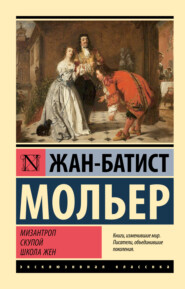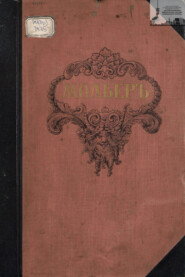По всем вопросам обращайтесь на: info@litportal.ru
(©) 2003-2024.
✖
The Impostures of Scapin
Год написания книги
2017
Настройки чтения
Размер шрифта
Высота строк
Поля
SCA. Never mind, we will share our perils like brothers, and three years more or less on the galleys are not sufficient to check a noble heart.
ACT II
SCENE I. – GÉRONTE, ARGANTE
GER. Yes, there is no doubt but that with this weather we shall have our people with us to-day; and a sailor who has arrived from Tarentum told me just now that he had seen our man about to start with the ship. But my daughter's arrival will find things strangely altered from what we thought they would be, and what you have just told me of your son has put an end to all the plans we had made together.
ARG. Don't be anxious about that; I give you my word that I shall remove that obstacle, and I am going to see about it this moment.
GER. In all good faith, Mr. Argante, shall I tell you what? The education of children is a thing that one could never be too careful about.
ARG. You are right; but why do you say that?
GER. Because most of the follies of young men come from the way they have been brought up by their fathers.
ARG. It is so sometimes, certainly; but what do you mean by saying that to me?
GER. Why do I say that to you?
ARG. Yes.
GER. Because, if, like a courageous father, you had corrected your son when he was young, he would not have played you such a trick.
ARG. I see. So that you have corrected your own much better?
GER. Certainly; and I should be very sorry if he had done anything at all like what yours has done.
ARG. And if that son, so well brought up, had done worse even than mine, what would you say?
GER. What?
ARG. What?
GER. What do you mean?
ARG. I mean, Mr. Géronte, that we should never be so ready to blame the conduct of others, and that those who live in glass houses should not throw stones.
GER. I really do not understand you.
ARG. I will explain myself.
GER. Have you heard anything about my son?
ARG. Perhaps I have.
GER. But what?
ARG. Your servant Scapin, in his vexation, only told me the thing roughly, and you can learn all the particulars from him or from some one else. For my part, I will at once go to my solicitor, and see what steps I can take in the matter. Good-bye.
SCENE II. – GÉRONTE (alone)
GER. What can it be? Worse than what his son has done! I am sure I don't know what anyone can do more wrong than that; and to marry without the consent of one's father is the worst thing that I can possibly imagine. {Footnote: No exaggeration, if we consider that this was said two hundred years ago, and by a French father.}
SCENE III – GÉRONTE, LÉANDRE
GER. Ah, here you are!
LEA. (going quickly towards his father to embrace him). Ah! father, how glad I am to see you!
GER. (refusing to embrace him). Stay, I have to speak to you first.
LEA. Allow me to embrace you, and…
GER. (refusing him again). Gently, I tell you.
LEA. How! father, you deprive me of the pleasure of showing you my joy at your return?
GER. Certainly; we have something to settle first of all.
LEA. But what?
GER. Just stand there before me, and let me look at you.
LEA. What for?
GER. Look me straight in the face.
LEA. Well?
GER. Will you tell me what has taken place here in my absence?
LEA. What has taken place?
GER. Yes; what did you do while I was away?
LEA. What would you have me do, father?
GER. It is not I who wanted you to do anything, but who ask you now what it is you did?
LEA. I have done nothing to give you reason to complain.
GER. Nothing at all?
LEA. No.
GER. You speak in a very decided tone.
LEA. It is because I am innocent.

















